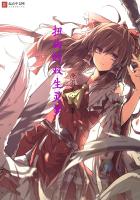Another voice, a man's voice, answered:--``Thank God! Let me fan him.You are tired.''
``I am not tired,'' answered the first voice.
``I do not see how you have stood it,'' said the man's voice.``You will kill yourself, Madame la Vicomtesse.
The danger is past now.''
``I hope so, Mr.Temple,'' said the first voice.``Please go away.You may come back in half an hour.''
I heard the footsteps retreating.Then I said: ``I am not asleep.''
The fan stopped for a brief instant and then went on vibrating inexorably.I was entranced at the thought of what I had done.I had spoken, though indeed it seemed to have had no effect.Could it be that I hadn't spoken? Ibegan to be frightened at this, when gradually something crept into my mind and drove the fear out.I did not grasp what this was at first, it was like the first staining of wine on the eastern sky to one who sees a sunrise.And then the thought grew even as the light grows, tinged by prismatic colors, until at length a memory struck into my soul like a shaft of light.I spoke her name, unblushingly, aloud.
``Helene!''
The fan stopped.There was a silence that seemed an eternity as the palm leaf trembled in her hand, there was an answer that strove tenderly to command.
``Hush, you must not talk,'' she said.
Never, I believe, came such supreme happiness with obedience.I felt her hand upon my brow, and the fan moved again.I fell asleep once more from sheer weariness of joy.She was there, beside me.She had been there, beside me, through it all, and it was her touch which had brought me back to life.
I dreamed of her.When I awoke again her image was in my mind, and I let it rest there in contemplation.
But presently I thought of the fan, turned my head, and it was not there.A great fear seized me.I looked out of the open door where the morning sun threw the checkered shadows of the honeysuckle on the floor of the gallery, and over the railing to the tree-tops in the court-yard.
The place struck a chord in my memory.Then my eyes wandered back into the room.There was a polished dresser, a crucifix and a prie-dieu in the corner, a fauteuil, and another chair at my bed.The floor was rubbed to an immaculate cleanliness, stained yellow, and on it lay clean woven mats.The room was empty!
I cried out, a yellow and red turban shot across the window, and I beheld in the door the spare countenance of the faithful Lindy.
``Marse Dave,'' she cried, ``is you feelin' well, honey?''
``Where am I, Lindy?'' I asked.
Lindy, like many of her race, knew well how to assume airs of importance.Lindy had me down, and she knew it.
``Marse Dave,'' she said, ``doan yo' know better'n dat?
Yo' know yo' ain't ter talk.Lawsy, I reckon I wouldn't be wuth pizen if she was to hear I let yo' talk.''
Lindy implied that there was tyranny somewhere.
``She?'' I asked, ``who's she?''
``Now yo' hush, Marse Dave,'' said Lindy, in a shrill whisper, ``I ain't er-gwine ter git mixed up in no disputation.
Ef she was ter hear me er-disputin' wid yo', Marse Dave, I reckon I'd done git such er tongue-lashin'--''
Lindy looked at me suspiciously.``Yo'-er allus was powe'rful cute, Marse Dave.''
Lindy set her lips with a mighty resolve to be silent.
I heard some one coming along the gallery, and then Isaw Nick's tall figure looming up behind her.
``Davy,'' he cried.
Lindy braced herself up doggedly.
``Yo' ain't er-gwine to git in thar nohow, Marse Nick,''
she said.
``Nonsense, Lindy,'' he answered, ``I've been in there as much as you have.'' And he took hold of her thin arm and pulled her back.
``Marse Nick!'' she cried, terror-stricken, ``she'll done fin' out dat you've been er-talkin'.''
``Pish!'' said Nick with a fine air, ``who's afraid of her?''
Lindy's face took on an expression of intense amusement.
``Yo' is, for one, Marse Nick,'' she answered, with the familiarity of an old servant.``I done seed yo' skedaddle when she comed.''
``Tut,'' said Nick, grandly, ``I run from no woman.
Eh, Davy?'' He pushed past the protesting Lindy into the room and took my hand.
``Egad, you have been near the devil's precipice, my son.A three-bottle man would have gone over.'' In his eyes was all the strange affection he had had for me ever since ave had been boys at Temple Bow together.
``Davy, I reckon life wouldn't have been worth much if you'd gone.''
I did not answer.I could only stare at him, mutely grateful for such an affection.In all his wild life he had been true to me, and he had clung to me stanchly in this, my greatest peril.Thankful that he was here, Isearched his handsome person with my eyes.He was dressed as usual, with care and fashion, in linen breeches and a light gray coat and a filmy ruffle at his neck.But I thought there had come a change into his face.The reckless quality seemed to have gone out of it, yet the spirit and daring remained, and with these all the sweetness that was once in his smile.There were lines under his eyes that spoke of vigils.
``You have been sitting up with me,'' I said.
``Of course,'' he answered patting my shoulder.``Of course I have.What did you think I would be doing?''
``What was the matter with me?'' I asked.
``Nothing much,'' he said lightly, ``a touch of the sun, and a great deal of overwork in behalf of your friends Now keep still, or I will be getting peppered.''
I was silent for a while, turning over this answer in my mind.Then I said:--``I had yellow fever.''
He started.
``It is no use to lie to you,'' he replied; ``you're too shrewd.''
I was silent again for a while.
``Nick,'' I said, ``you had no right to stay here.You have--other responsibilities now.''
He laughed.It was the old buoyant, boyish laugh of sheer happiness, and I felt the better for hearing it.
``If you begin to preach, parson, I'll go; I vow I'll have no more sermonizing.Davy,'' he cried, ``isn't she just the dearest, sweetest, most beautiful person in the world?''














